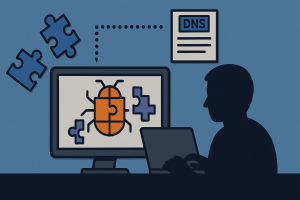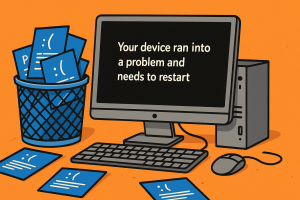 A new cybersecurity threat is emerging as attackers use DNS records—the very system that directs internet traffic—to hide malware. Instead of relying on email attachments or suspicious downloads, bad actors are embedding malicious payloads into DNS TXT records. This method sneaks malicious code past traditional defenses because security tools often ignore DNS traffic.
A new cybersecurity threat is emerging as attackers use DNS records—the very system that directs internet traffic—to hide malware. Instead of relying on email attachments or suspicious downloads, bad actors are embedding malicious payloads into DNS TXT records. This method sneaks malicious code past traditional defenses because security tools often ignore DNS traffic.
DNS, or Domain Name System, acts like the internet’s phonebook, translating domain names into IP addresses. It is so fundamental and routine that most security systems allow it without scrutiny. That makes it a perfect hiding place. According to researchers at Infoblox, attackers are disguising shellcode—malicious binary instructions—inside base64-encoded TXT records. These look like harmless text but are reassembled and executed by compromised devices once fetched. [Read more…]
 If you use an Android phone, there’s a good chance Google’s Gemini AI is now interacting with your apps, even if you thought you had disabled it. The company recently rolled out changes that grant Gemini new levels of access to messages, phone calls, and third-party apps like WhatsApp, regardless of whether users had previously opted out. If that sounds invasive, it’s because it is.
If you use an Android phone, there’s a good chance Google’s Gemini AI is now interacting with your apps, even if you thought you had disabled it. The company recently rolled out changes that grant Gemini new levels of access to messages, phone calls, and third-party apps like WhatsApp, regardless of whether users had previously opted out. If that sounds invasive, it’s because it is. You click a link. It takes you to a site that looks exactly right. The logo matches, the name checks out, and everything feels familiar. But something’s off. And before you realize what it is, you’ve handed over your login, your credit card, or worse, your network credentials. The trick wasn’t in the layout or the content. It was in the letters.
You click a link. It takes you to a site that looks exactly right. The logo matches, the name checks out, and everything feels familiar. But something’s off. And before you realize what it is, you’ve handed over your login, your credit card, or worse, your network credentials. The trick wasn’t in the layout or the content. It was in the letters. A surveillance app marketed as a stealthy tool for parents has exposed sensitive data from over 62,000 users, raising fresh concerns about the real audience for apps like it.
A surveillance app marketed as a stealthy tool for parents has exposed sensitive data from over 62,000 users, raising fresh concerns about the real audience for apps like it. After 40 years of glaring blue error messages and frowny faces, Microsoft is giving the infamous Blue Screen of Death a final sendoff. Starting later this summer, Windows 11 devices will crash in a new color. Say hello to the Black Screen of Death.
After 40 years of glaring blue error messages and frowny faces, Microsoft is giving the infamous Blue Screen of Death a final sendoff. Starting later this summer, Windows 11 devices will crash in a new color. Say hello to the Black Screen of Death.